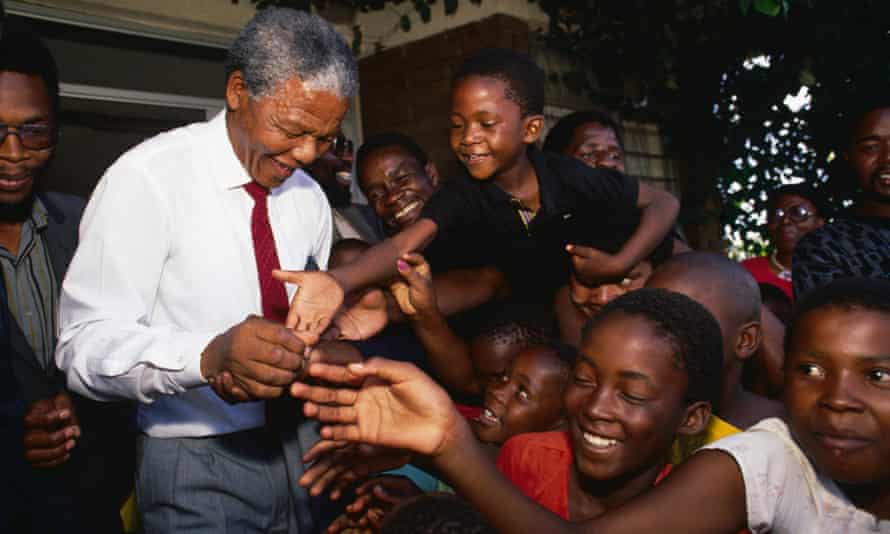ââåbe Kind to Others So That You May Learn the Secret Art of Being Kind to Yourselfã¢ââ
I t was freezing cold the day Neil Laybourn saw a human being in a T-shirt sitting on a high ledge on Waterloo Span and made a split-2nd decision that would alter both their lives for e'er. "Information technology's hard to pin downward what it was that made me terminate… merely it would have played on my heed if I hadn't," he said. "That'due south not how you live your life is it? You don't but walk past when you see someone in demand."
On that Jan morn in London'due south rush hr, hundreds of other people were doing exactly that. But Laybourn didn't and – it turned out the man, Jonny Benjamin, was contemplating suicide. Six years later he would launch a campaign to discover and thank Laybourn for persuading him down off that ledge. The two of them now give talks on mental health problems and suicide prevention together.
Looking back now on that day, Laybourn says: "It'south made me much more aware of how important it is to put the amount of kindness you have in you, out into the world."
But what is information technology, exactly, that makes us kind? Why are some of united states kinder than others – and what stops us from being kinder?
The Kindness Exam, a major new study involving more than lx,000 people from 144 unlike countries, has been looking into these and other questions. Launched on BBC Radio iv and devised by the University of Sussex, it is believed to be the largest public study of kindness ever carried out in the world.
The results, which are currently the subject of a three-office Radio 4 documentary The Beefcake of Kindness, suggest that people who receive, requite or even just discover more than acts of kindness tend to experience higher levels of wellbeing and life satisfaction.
Other encouraging findings are that every bit many as two-thirds of people think the pandemic has fabricated people kinder and nearly 60% of participants in the report claimed to have received an act of kindness in the previous 24 hours.
"It is a big role of homo nature, to be kind – because information technology's such a big role of how we connect with people and how we have relationships," says Claudia Hammond, visiting professor of the public agreement of psychology at the University of Sussex and presenter of the documentary. "It'southward a win-win situation, because we like receiving kindness, but nosotros also like existence kind."

Our desire to be kind is actually quite selfish, on one level, she explains. Because nosotros accept evolved to have empathy, we have all sorts of "ulterior motives" for being kind – the chief one beingness that it makes the states feel good. "We know from encephalon research, in that location is a warm fuzzy feeling that people feel straight abroad. Simply also, information technology gives you lot the sense that you are a kind person who cares about other people. And we want to be practiced, we want to experience good nigh ourselves and what nosotros are like."
Your religious behavior and your values system also assistance to determine how kind you are, the written report shows. "Nosotros found those who believed benevolence was important were more likely to requite than those who believed ability and accomplishment were more than of import."
People who accept been told they should be kind are naturally more probable to notice opportunities to be kind: "They accept expectations, which might be the expectations of their religious teachings or it might be the expectations of those effectually them," Hammond says.
This may be one of the reasons why women who filled in the study's online questionnaire were more than probable to report being kind, receiving kindness and seeing kindness. Women may feel that they ought to written report performing acts of kindness, because caring for people and comforting them is traditionally seen as a more "feminine" action, she says.
For this reason, Hammond is concerned well-nigh the use of the hashtag #BeKind on social media. "Information technology'southward sometimes used to shut women downwardly from talking, to advise they can't concord an opinion, because they've got to 'be kind'. And manifestly nosotros want social media to be a kinder place. Just if kindness and then gets weaponised and used to terminate people talking, so I recollect that'south a worry."
While boys wear slogans like 'born to win', letters like 'be kind' and 'kindness always wins' litter immature girls' clothing . Hammond questions how much girls are stereotypically being taught, at a young age, to be caring – and whether that puts an unequal corporeality of pressure level on girls to exist kind as they grow upwardly. "What I would hope is that boys are being taught to be nurturing likewise."

Overall, the study suggests the greatest predictor of how kind you are to others – and how kind they are to you – is non your gender, but your personality. People who scored high on extraversion, openness to new experiences and agreeableness self-reported giving and receiving more than kindness, every bit did people who talk to strangers.
The reason for this may simply be that these people have more confidence to be kind, Hammond says. The most common barrier to kindness reported by British people in the study was a fear that their behaviour would be misinterpreted. "You need confidence to be able to offer kindness and to confront the possibility that your offer of kindness may be rejected. And people may be happier to do that, and talk to strangers, if they are extroverted."
To get over this fearfulness of misinterpretation, Hammond recommends you remind yourself how astonishing it tin can feel to receive an act of kindness. "When we asked people how they felt, they said warm and happy and grateful and loved and pleased."
Luke Cameron, dubbed the "nicest man in Britain", once spent a yr doing a good deed every mean solar day to raise money for 45 different charities. It taught him that sometimes offering some help, reassurance or a kind word tin can brand a huge divergence to strangers. "Information technology's made me more than aware of things that happen in forepart of me. If someone falls over in the street, there's e'er going to exist people who get and help and others who stand back. It'due south fabricated me 1 of those people who go and help. Consciously, I at present just do information technology."
He became that person, he says, later on a "mindset shift" where he realised: "Really, if it was me, I'd desire somebody to assist me. That makes you retrieve differently about how you are with people."
Similar Laybourn and Hammond, Cameron says that you have a option when you collaborate with people – and the more you try to find opportunities to be kind, the easier it gets. "It was actually the pocket-sized things that I found were the most impactful," he says.
For case, he in one case bought coffee for a adult female who looked sad in a Costa Coffee store and invited her to sit with him. She thanked him, saying no one had been kind to her like that in a while, and so poured her heart out to him about her friend, who was really struggling with cancer.
As she left, he realised she was wearing a wig and her eyebrows had been drawn on. "It dawned on me, she was the 1 going through cancer and she needed somebody to talk to about what she was going through. So she spoke to a complete stranger." He will never forget their chat and its impact on him. "That will always stay with me."
Talking to strangers makes the states feel more connected with each other, says Hammond: "People oft think that conversations with strangers are quick and shallow and saying hello to someone in a shop doesn't really matter. Simply actually information technology does. All of these things are received kindly past other people because they connect u.s.. And connection is everything."
Source: https://www.theguardian.com/science/2022/mar/13/cool-to-be-kind-being-nice-is-good-for-us-so-why-dont-we-all-do-it
Post a Comment for "ââåbe Kind to Others So That You May Learn the Secret Art of Being Kind to Yourselfã¢ââ"